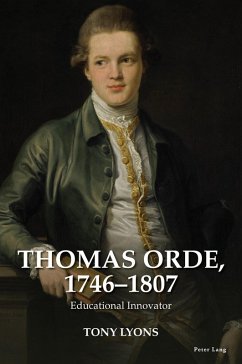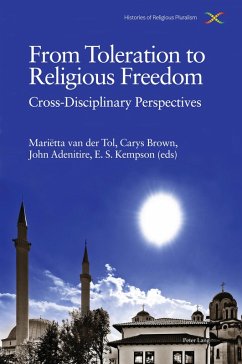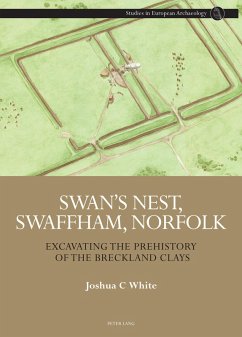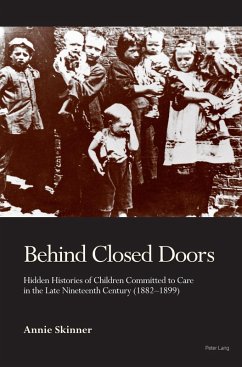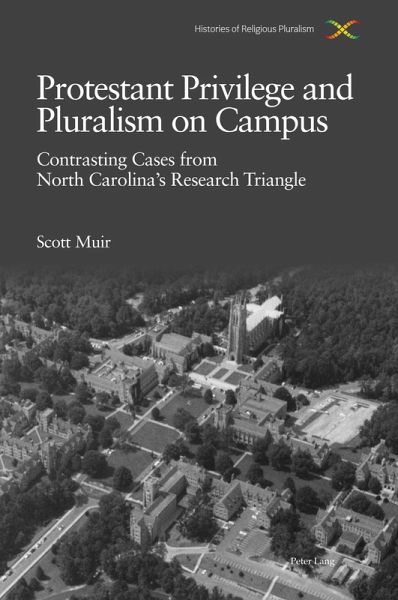
Protestant Privilege and Pluralism on Campus (eBook, ePUB)
Contrasting Cases from North Carolina's Research Triangle, c.1800-Present
Versandkostenfrei!
Sofort per Download lieferbar
Statt: 52,95 €**
45,95 €
inkl. MwSt.
**Preis der gedruckten Ausgabe (Broschiertes Buch)
Alle Infos zum eBook verschenkenWeitere Ausgaben:

PAYBACK Punkte
23 °P sammeln!
«Muir offers a compelling take on the intricacies of religious pluralism in U.S. higher education. Rich portrayals of Protestant, secular, and pluralist dynamics at four unique campuses shed light on their distinctive histories and provide timely implications for leaders and educators seeking to cultivate campus environments where all can flourish.»(Alyssa Rockenbach, Professor & Alumni Distinguished Graduate Professor, North Carolina State University)«In his astute analysis of religious life on four North Carolina campuses, Scott Muir finds that, aside from a general pattern of secularizat...
«Muir offers a compelling take on the intricacies of religious pluralism in U.S. higher education. Rich portrayals of Protestant, secular, and pluralist dynamics at four unique campuses shed light on their distinctive histories and provide timely implications for leaders and educators seeking to cultivate campus environments where all can flourish.»
(Alyssa Rockenbach, Professor & Alumni Distinguished Graduate Professor, North Carolina State University)
«In his astute analysis of religious life on four North Carolina campuses, Scott Muir finds that, aside from a general pattern of secularization and a gradual increase in religious diversity, Protestant privilege endures, even as campuses accommodate religious pluralism. More important, the author's careful, exhaustive research and nuanced analyses of distinctive campus religious climates should make us wary of standard, one-size-fits-all narratives about the slippery slope toward secularism in the academy.»
(Randall Balmer, John Phillips Professor of Religion, Dartmouth College)
This book illustrates how the university campus has been and continues to be a crucial space where diverse actors who embody Protestant, secular and pluralist forces negotiate the role of religion in a pluralistic society. Through comparative analysis of four distinct institutions in North Carolina's Research Triangle from the nineteenth century to the present day, we observe how campus religious climates have varied quite significantly within a single metropolitan area - all the more across the vast system of American higher education. Institutional identity factors including race, gender, geographical reach, resource disparities, and denominational affiliations have powerfully shaped the way these universities relate to their Protestant roots amidst growing religious diversity. And these universities, in turn, have accelerated the religious transformation of a region of the American South that is emblematic of widening cultural divides. Protestant Privilege and Pluralism on Campus illuminates a range of challenges to achieving a substantive and inclusive dialogue about meaning and values on campus and beyond.
(Alyssa Rockenbach, Professor & Alumni Distinguished Graduate Professor, North Carolina State University)
«In his astute analysis of religious life on four North Carolina campuses, Scott Muir finds that, aside from a general pattern of secularization and a gradual increase in religious diversity, Protestant privilege endures, even as campuses accommodate religious pluralism. More important, the author's careful, exhaustive research and nuanced analyses of distinctive campus religious climates should make us wary of standard, one-size-fits-all narratives about the slippery slope toward secularism in the academy.»
(Randall Balmer, John Phillips Professor of Religion, Dartmouth College)
This book illustrates how the university campus has been and continues to be a crucial space where diverse actors who embody Protestant, secular and pluralist forces negotiate the role of religion in a pluralistic society. Through comparative analysis of four distinct institutions in North Carolina's Research Triangle from the nineteenth century to the present day, we observe how campus religious climates have varied quite significantly within a single metropolitan area - all the more across the vast system of American higher education. Institutional identity factors including race, gender, geographical reach, resource disparities, and denominational affiliations have powerfully shaped the way these universities relate to their Protestant roots amidst growing religious diversity. And these universities, in turn, have accelerated the religious transformation of a region of the American South that is emblematic of widening cultural divides. Protestant Privilege and Pluralism on Campus illuminates a range of challenges to achieving a substantive and inclusive dialogue about meaning and values on campus and beyond.
Dieser Download kann aus rechtlichen Gründen nur mit Rechnungsadresse in A, D ausgeliefert werden.





